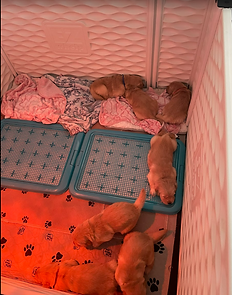Watch for a litter update in late 2026
Follow along on Instagram

We have adopted the principles of Puppy Culture for our puppies' socialization and preparatory training. This approach focuses on tailoring the training to the puppy's unique needs and allowing them to lead their learning journey. By observing their behavioral cues, we can provide them with age-appropriate experiences and lessons in a structured manner.
The benefits include maximizing learning by allowing the puppy to lead, minimizing stress by prioritizing their emotional well-being, and building confidence by presenting challenges within their capabilities. We celebrate each puppy's individuality and focus on nurturing their unique qualities rather than measuring them against arbitrary standards.
We prioritize ongoing learning about puppy development and training techniques, adapting to their developmental stage to ensure they progress seamlessly through each growth phase. We adhere to positive reinforcement principles, avoiding outdated dominance theories or punitive methods and relying on the latest scientific research and insights into puppy rearing to provide the best possible care and training for our furry companions. Here's a glimpse into the steps we take to ensure our puppies grow into confident, balanced adults.
Our Puppy Culture training starts on day one with stroking the newborns as much as mom will permit. On day three, we begin Early Neurological Stimulation (ENS), which has been observed to improve a puppy's cardiovascular performance, adrenal glands, stress tolerance, and disease resistance. ENS is performed from the 3rd to the 16th day of a puppy's life.


To build confidence in our puppies, we expose them to a wide range of new people. Our aim is for each puppy to meet old, young, large, and small people. People with, hats, glasses, and facial hairs and every variation in between before they go to their new homes at 8 weeks old. From the moment they're born, puppies receive individual snuggle time, fostering a strong bond with people right from the start.
Puppies start eliminating on their own around 14 to 18 days, and we introduce a designated potty area to assist with future house training. We also start "startle recovery" sessions to help them become more resilient. Throughout the day, puppies experience a mix of quiet time, playtime, exposure to various household noises, and everyday sounds to keep them well-adjusted.

Empowering our puppies with communication skills, we train them to "mand." This technique enables puppies to request something using their body language, creating a mutual understanding between them and us.

We start with what we call the "Puppy call," which is the initial step in teaching our puppies to come when called (the start of the recall). We use this cue every time we feed them. Alongside, we start teaching them to respond to treats, laying the foundation for more structured training sessions.


